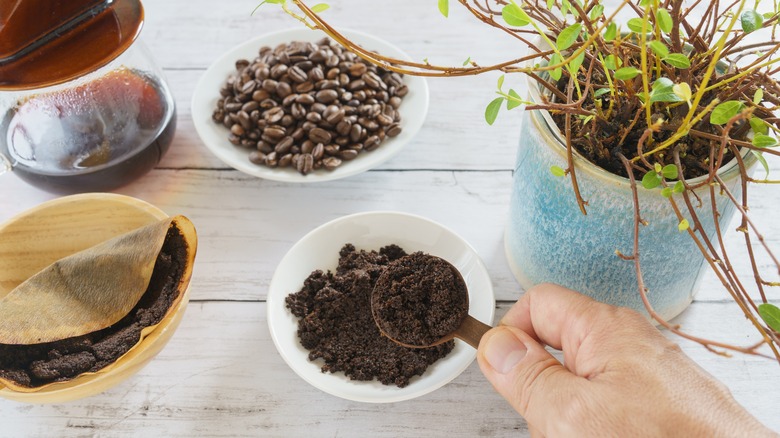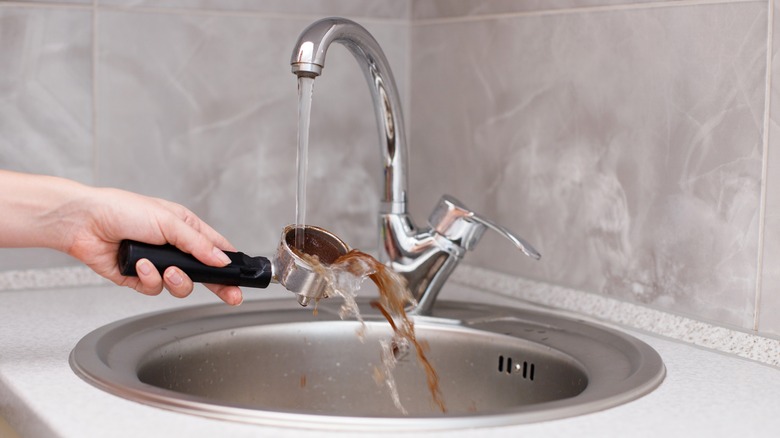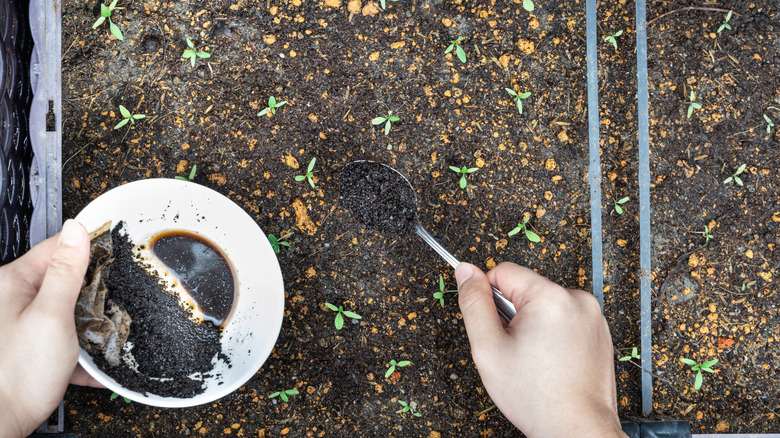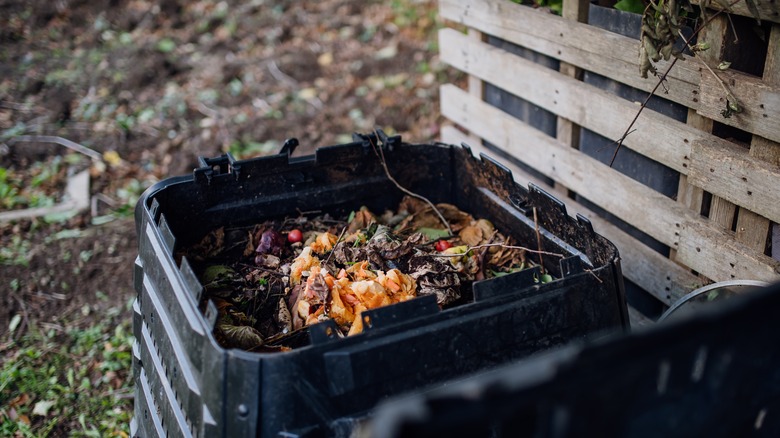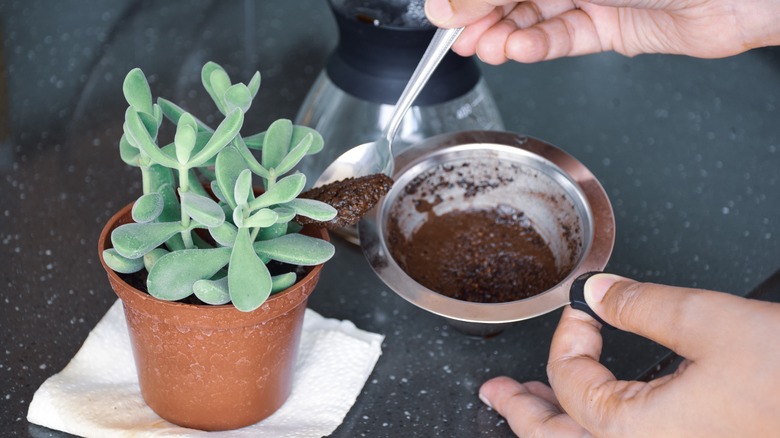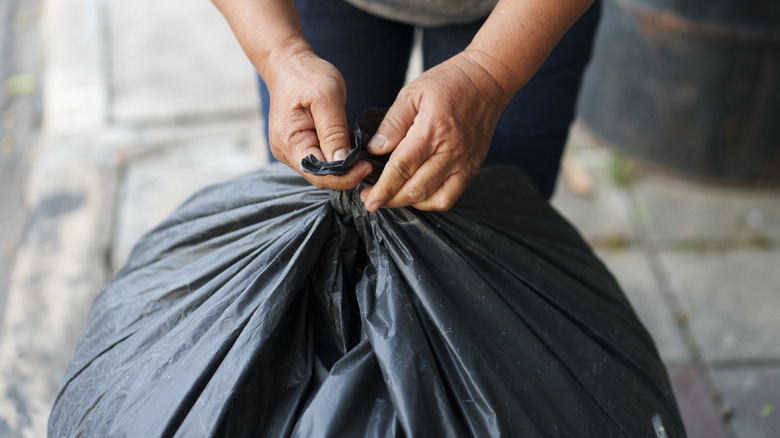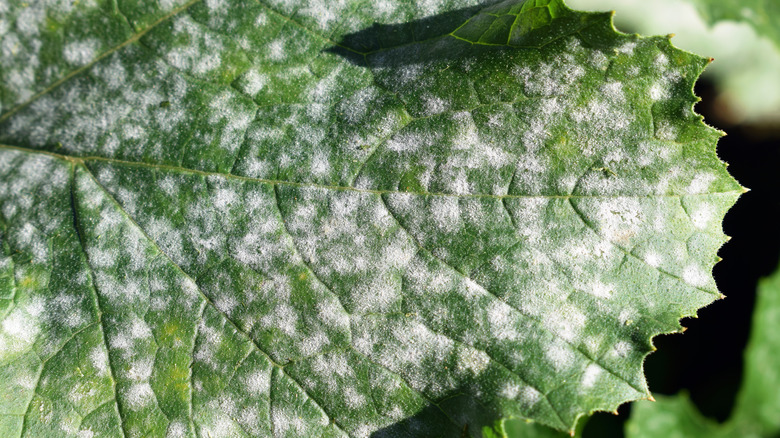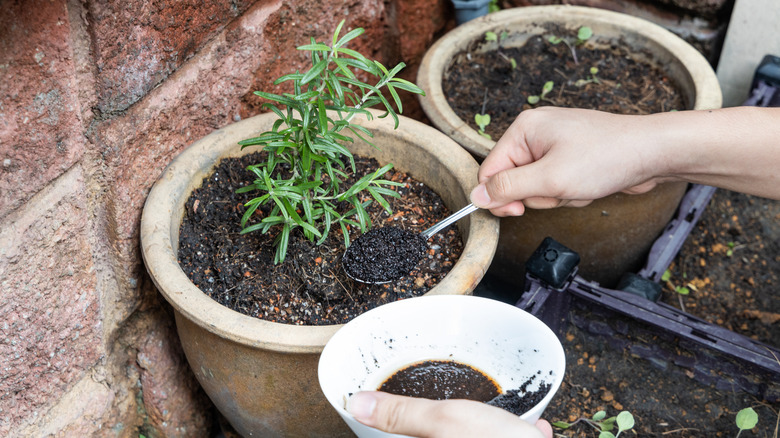Things You Should Never Do With Coffee Grounds Around Your Home And Garden
We may receive a commission on purchases made from links.
A warm mug is probably one of the first things that come to mind when many people think of coffee. But coffee grounds can be used for much more than making one of the world's most popular caffeinated beverages. The internet is buzzing with interesting tips and creative ways to use coffee grounds in your home and garden. Some of these hacks include making your own flower food from coffee grounds and repelling insects. But while you may already be aware of many of the cool ways you can use coffee grounds, you may not be wise to the ways you shouldn't be utilizing them around the house.
Despite being helpful in a wide variety of situations, coffee grounds can also be harmful if not used correctly. From preventing seeds from germinating to potential plumbing problems, spent java grounds aren't always your friend. Read on to learn about some of the things you should avoid doing with coffee grounds in your home and garden.
Putting coffee grounds down the drain is a no-no
Throwing old coffee grounds down the drain might seem like a quick and easy way to dispose of them. In fact, you may have even heard that putting coffee grounds through the drain every day can be beneficial, but that actually isn't the case. Coffee grounds can be very harmful to your plumbing, and dumping them in the drain can potentially lead to costly repairs.
Over time, coffee grounds that have been put down the drain can create a sludge-like substance that can lead to build-up and ultimately clog your pipes. It's important to note that you should avoid putting coffee grounds through the drain even if you have a garbage disposal. Instead of tossing used grounds in the sink, you may want to consider alternative disposal methods, such as leveraging them for fertilizer (used coffee grounds are best for this), placing them in the compost, or making DIY body scrubs, insect repellents, or deodorizers.
Coffee grounds could be harmful to your seedlings
In general, you may want to avoid adding non-decomposed coffee to the soil around any seedlings in your garden. This is because the caffeine in coffee can slow down germination in certain species. This is due to a process called allelopathy, which results in chemicals from the caffeine being released into the soil and suppressing the growth of nearby plants. However, please note that research has shown that some species, such as tomatoes and radishes, actually thrive when top-dressed with partially decomposed coffee grounds.
While caffeine may prevent some seeds from growing, the good news is that this could be beneficial to your garden in other ways. Thanks to caffeine's allelopathic properties, it can also prevent weeds from growing, making it a great option for people who are looking for a natural alternative to store-bought weed killers. So, while un-decomposed coffee grounds might not be the best thing to use on a lot of seedlings in your garden, they are still worth considering if you've been dealing with weeds that just won't back down.
There's such a thing as too much coffee in your compost pile
Used coffee grounds are a popular ingredient in many people's compost piles. In fact, adding old grounds to your compost has several benefits, including maintaining the temperature of the pile. But did you know that it's possible to put too much coffee in your compost? That's right, overloading your compost with used coffee grounds can result in excess nitrogen. Although nitrogen is one of the important ingredients for good compost, too much can leave your pile with a slimy texture and a foul odor.
According to the University of California Agriculture and Natural Resources, your compost should contain no more than 20% coffee grounds. If you're worried you may have added too much coffee to your compost, you can counteract and remedy this by adding "brown materials" like paper, leaves, eggshells, branches, cardboard, and hay. The carbon in these items will help balance out the nitrogen that is released from the caffeine in the coffee grounds.
Mulching with a thick layer of pure coffee grounds could be a recipe for disaster
If you spend a lot of time in your garden or have a pot plant hobby, you probably know that mulching can stop soil drying out around plants and lock in moisture. It can also be an invaluable source of top dressing, and encourage beneficial soil bacteria. However, even though applying gardening mulch can be a good idea, using only coffee grounds might not work out in your favor. As noted previously, coffee grounds could have adverse effects on seedlings and other plants in your garden that may be sensitive to caffeine or acid. Furthermore, an overly thick layer of pure coffee grounds can dry into a hard cake that water has a tough time re-saturating.
Fortunately, you can still use coffee in your mulch if you'd like to. However, there are some things you should be mindful of. Instead of making mulch entirely from coffee, experts suggest combining the grounds with other organic materials such as woodchips, leaves, and plant clippings. Hay and grass clippings can also help lighten coffee grounds and prevent them from drying down into a cap.
Avoid throwing used coffee grounds in the garbage
Have you been throwing your used coffee grounds in the garbage can? You might want to reconsider after reading this. Although throwing old coffee in the trash might seem like a logical disposal method, it could actually be harmful to the environment. When discarded coffee grounds are taken to landfills, they begin to decompose and release methane and a variety of other detrimental greenhouse gasses into the atmosphere.
Luckily, there are plenty of ways that you can dispose of your old coffee that can help reduce your carbon footprint and give your coffee grounds a second life. Some of your options include composting (but remember not to use too much coffee in relation to other materials and scraps) and making face and body scrubs. Those who have pets can even test out the use of coffee as a natural way to repel fleas by rubbing the grounds directly onto the cat or dog's coat. Be mindful to ensure that your pet does not consume any coffee grounds as caffeine can be toxic if ingested by your fur baby, and be aware that this method won't be as effective as store-bought anti-flea products. If you're feeling extra creative, you can even make a DIY candle out of your old coffee grounds to help eliminate bad smells in your home.
Coffee and plants that are susceptible to fungal disease might not mix
As mentioned earlier, if applied on their own as a thick layer of mulch, coffee grounds can dry out and stop water from easily reaching the soil below. In very moist situations, they can cause the opposite problem. If applied in excess during wet or humid conditions, coffee grounds could create an environment where fungi easily thrive. This can be bad news for plants that easily contract fungal diseases such as powdery mildew. Some of the plants most susceptible to this pesky disease include roses, peas, and squash.
If you've already been using coffee grounds in your garden but aren't sure if any of your plants are prone to fungal diseases, some of the signs to look out for include spots on the leaves that have a furry, powdery look to them, stem rot, and small white dots. Certain fungal diseases can also cause plants to wilt. Thankfully, if your plants do have a fungal disease, you'll be happy to know that it doesn't necessarily mean the end of the road. Fungal diseases in plants are very common and can typically be cured. Start by ensuring you aren't overwatering, position plants where they receive adequate sunlight, try to increase ventilation in the garden, and use a fungicide if all else fails.
Amending with coffee grounds might not be ideal for all plants
As mentioned earlier, coffee grounds can be a great ingredient to your fertilizer. However, whether or not coffee is a perfect fit for your garden depends on the types of plants you're growing. While coffee grounds can be ideal for species like blueberries and magnolias, there might be other plants in your garden that don't like coffee as much, like roses and lilacs, which are sensitive to acid soils. Although research has shown that coffee grounds don't have as much of an impact on soil pH levels as was once thought, it also notes that the pH of decomposing coffee grounds is unstable, so it's still good to be mindful of your plants' pH needs before adding coffee to the mix.
Attempting to fertilize plants that don't like acidic soil with coffee grounds probably won't damage your garden, but it also may not boost growth in the way you envision. Prior to using coffee grounds as fertilizer, you should make note of what pH your plants need to thrive. For example, species like lavender and rosemary prefer neutral to alkaline soil, so you may want to reserve any spent java grounds for your more acid-loving specimens. Experts also recommend checking your soil's pH regularly, with a range of 6 to 7 being the most ideal. To measure the pH of your soil, you can either use a pH meter (you can get one from Amazon for under $7) or pH strips to create DIY soil health tests, or send some soil samples off to a lab for more in-depth test results that will include a nutrient analysis.
